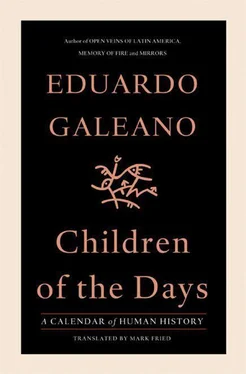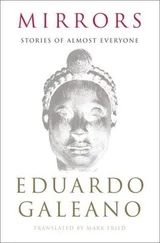The winner, Leonardo da Cutri, received a prize of a thousand ducats, an ermine cape and a letter of congratulations from King Philip II of Spain.
The loser, Ruy López de Segura, wrote the book that founded the art of black — white combat on the checkered field. In that work the author, a cleric, beatifically advised:
When you sit down to play, if it is a clear and sunny day, make sure the enemy has the sun in his face, because it will blind him. And if it is dark and you are playing with lamps, put the light on his right because it will bother his eyes and cast a shadow when he reaches his right hand over the board, so he will have a hard time seeing where he is moving the pieces.
August 20. HEAVEN’S WORKFORCE
In the Ecuadorian highlands stands the church of Licto.
This fortress of the faith was reconstructed using gigantic stones, as the twentieth century came into being.
Since slavery was long gone, or so said the law, free Indians took up the task: they carried the stones on their backs from a quarry several leagues distant, and several of them lost their lives walking those narrow paths alongside deep gorges.
The priests charged sinners in stones for their salvation. Every baptism was paid for with twenty, and a wedding cost twenty-five. Fifteen stones was the price of a burial. If the family did not deliver them, the deceased could not enter the cemetery; he was buried in “evil land” and from there went straight to hell.
August 21. THE DIVISION OF LABOR
At Stanford University in the United States psychologists carried out a revealing experiment on the relationship between man and function.
They recruited a few students, white, well-educated, well-behaved and in good physical and mental health.
The toss of a coin decided who would be the jailer and who the prisoner in a fictitious jail set up in the basement of a university building.
The prisoners, unarmed, were numbers without names. The jailers, names without numbers, carried nightsticks.
It seemed like a game, but from the very first day those playing the role of jailer began to enjoy its pleasures. Permission to use the toilet was given only after much begging, prisoners were obliged to sleep naked on the concrete floor, and those who protested paid for their insolence in punishment cells, deprived of food and water.
Blows, insults, humiliations: the experiment did not last long. No more than a week. On this day in 1971, it ended.
August 22. THE BEST WORKERS
The French priest Jean-Baptiste Labat recommended in one of his books published in 1742:
African ten-to-fifteen-year-olds are the best slaves to take to America. The advantage is you can educate them so that they’ll keep up the pace as best suits their masters. Children more easily forget their native countries and the vices that hold sway there, they become fond of their masters and they are less inclined to rebel than older blacks.
This pious missionary knew what he was talking about. On the French islands of the Caribbean, Père Labat performed baptisms, communions and confessions, and between masses kept an eye on his properties. He owned lands and slaves.
August 23. THE IMPOSSIBLE COUNTRY
In 1791 another owner of lands and slaves sent a letter from Haiti: “The blacks are very obedient and will remain so always,” it said.
The letter was making its way to Paris when the impossible happened: on the night of August 22, a stormy night, the greatest slave uprising in the entire history of humanity exploded from the depths of the Haitian jungle. And those “very obedient” blacks went on to humble the army of Napoleon Bonaparte that was soon to overrun Europe from Madrid to Moscow.
August 24. IT WAS THE DAY OF THE ROMAN GOD OF FIRE
And it was the year 79.
Pliny the Elder was sailing the world at the helm of a Roman fleet.
When he entered the Bay of Naples, he saw black smoke rising out of Vesuvius like a tall tree opening its branches to the sky. Suddenly night fell at noon, the world shook with violent tremors and a bombardment of fiery stones buried the carefree city of Pompeii.
A few years before, fire had razed the city of Lugdunum and Seneca had written: “A single night lay between the greatest city and none.”
Lugdunum revived and is now called Lyon. Pompeii did not disappear; it lay intact under the ashes, preserved by the volcano that destroyed it.
August 25. THE IMPRISONED CITY IS RESCUED
At dawn on this day in 1944, Paris went crazy.
The Nazi occupation was over.
The first tanks and armored cars had entered the city a few hours before. “Is it the Americans?” people asked.
The names scrawled in white paint on those tanks and armored cars were: “Guadalajara,” “Ebro,” “Teruel,” “Brunete,” “Madrid,” “Don Quijote,” “Durruti”.
The first liberators of Paris were the Spanish Republicans.
Defeated in their own land, they had fought for France.
They were convinced that Spain’s rescue would follow.
They were wrong.
August 26. PURITY OF THE FAITH
Ivan the Terrible was born on this day in 1530.
To educate the people in the Christian faith, in Moscow he built the great cathedral of Saint Basil, which remains the loveliest symbol of the city, and to perpetuate his Christian power he sent a few sinners to hell, his rivals, his relatives:
he set the dogs on Prince Andrei and Archbishop Leonid;
he burned Prince Pyotr alive;
with an ax he chopped up the princes Aleksandr, Repnin, Snuyon, Nikolai, Dmitri, Telepnev and Tyutin;
he drowned his cousin Vladimir in the river, as well as his sister-in-law Aleksandra and his aunt Eudoxia;
he poisoned five of his seven wives;
and with a blow from his cane he killed his son, his favorite, the one who bore his name, because the affront was too great.
August 27. PURITY OF THE RACE
In 1924 an imprisoned Adolf Hitler dictated his book Mein Kampf . On a day like today, he transmitted to the scribe what for him was the fundamental lesson of history:
All the great cultures of the past perished only because the originally creative race died out from blood poisoning.
Fourteen years later, Benito Mussolini proclaimed in his Manifesto of Race:
The purely European physical and psychological characteristics of Italians should not be altered in any way whatsoever. It is high time that the Italians declare themselves to be frankly racist.
August 28. “I HAVE A DREAM”
On this day in 1963, before an immense crowd carpeting the vast open mall of Washington, the Reverend Martin Luther King Jr. dreamed out loud:
“I have a dream that my four children will one day live in a nation where they will not be judged by the color of their skin but by the content of their character. I have a dream that one day every valley shall be exalted, every hill and mountain shall be made low. ”
At the time the FBI had declared King “the most dangerous Negro of the future in this nation,” and numerous spies followed his every step, day and night.
But he continued denouncing racial humiliation and the Vietnam War, which turned black men into cannon fodder, and without any hesitation he said that his country was “the greatest purveyor of violence in the world.”
In 1968 a bullet split his skull.
Beloved white brother:
When I was born, I was black .
When I grew up, I was black .
When I am in the sun, I am black .
Читать дальше












